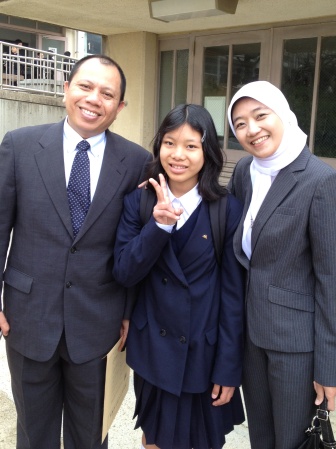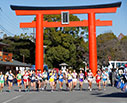![]()
Fair Treatment + Equal Rights - Discrimination = A more Peaceful World
Nino Viartasiwi
Doctoral Degree Program 4th year
Graduate School of International Relations
Introducing International Students
Currently, there are about 1,000 international students studying at Ritsumeikan University. They are here to achieve their goals. The number of international students from Asia in particular has seen an increase.
Please take a look at the interviews for the three international students from Indonesia.
What do you study and what is your research at Ritsumeikan University?
I am studying at the International Relations faculty, focusing on peace and conflict studies. My research’s theme is the conflict in Papua region of Indonesia.
Why did you pick the theme?
The Papua conflict is the longest ongoing conflict in Indonesia. Since the Papua incorporation into Indonesia in 1962/1969, the region has been suffered with chronic violent clashes, human rights violation, decelerate development and political marginalization. Despite many efforts have been conducted by the government, the condition does not improve much. I hope I can offer some new insights on the issue of Papua conflict.
Why did you choose Ritsumeikan?
First, I realized that in Indonesia we don’t have many scholars in social science who graduated from Japan’s universities. Even though the Asian view of politics is rather a myth than reality, I was very much interested to be educated in this prominent Asian country to gain a different perspective in political science. Secondly, when I searched for professor to be my supervisor, I found Professor Jun Honna in Ritsumeikan University. I found that Professor Honna’s works were very interesting. I wanted to be his student. Third, Ritsumeikan offered a very handsome scholarship and many excellent programs to fully support its graduate students. Three reasons were enough for me to choose Ritsumeikan University.

Are you studying at your own expense or on government expense?
During my master I got full-coverage scholarship from MEXT. For my doctoral study I am supported by MEXT for the living cost, and full-coverage tuition fee from Ritsumeikan University.
What is good about studying at Ritsumeikan University?
Excellent professors and good systems. Every semester we have to give a progress report presentation in front of a group of professors, so they monitor every step of our works, and understand the big picture of our dissertations. Moreover, I found that Ritsumeikan system of weekly seminar class with our supervisors and friends is very effective. During the seminar classes the professors can observe the development of my study. It is very good system to support us, graduate students, because sometimes we feel very pessimistic in our study. Sharing with friends and gaining advice from professor is a good encouragement. Also, there are many generous supports for doctoral students from the office of Graduate Schools. For example, we are fully covered to go to field work twice a year. I don’t think many universities have this kind of support for doctoral students.
What is your dream?
My dream in the future is a peaceful Papua with respect for the dignity of the Papuan, and a great Indonesia. My personal dream is to become a scholar in peace and conflict studies.
A Message for the Teenagers in Indonesia.
Do the best and believe in whatever you do. If you have done your best, no matter what will happen, at the end of the day you can tap on your own shoulder and claim: well done!
Currently, there are about 1,000 international students studying at Ritsumeikan University. They are here to achieve their goals. The number of international students from Asia in particular has seen an increase.
Please take a look at the interviews for the three international students from Indonesia.
What do you study and what is your research at Ritsumeikan University?
I am studying at the International Relations faculty, focusing on peace and conflict studies. My research’s theme is the conflict in Papua region of Indonesia.
Why did you pick the theme?
The Papua conflict is the longest ongoing conflict in Indonesia. Since the Papua incorporation into Indonesia in 1962/1969, the region has been suffered with chronic violent clashes, human rights violation, decelerate development and political marginalization. Despite many efforts have been conducted by the government, the condition does not improve much. I hope I can offer some new insights on the issue of Papua conflict.
Why did you choose Ritsumeikan?
First, I realized that in Indonesia we don’t have many scholars in social science who graduated from Japan’s universities. Even though the Asian view of politics is rather a myth than reality, I was very much interested to be educated in this prominent Asian country to gain a different perspective in political science. Secondly, when I searched for professor to be my supervisor, I found Professor Jun Honna in Ritsumeikan University. I found that Professor Honna’s works were very interesting. I wanted to be his student. Third, Ritsumeikan offered a very handsome scholarship and many excellent programs to fully support its graduate students. Three reasons were enough for me to choose Ritsumeikan University.
Are you studying at your own expense or on government expense?
During my master I got full-coverage scholarship from MEXT. For my doctoral study I am supported by MEXT for the living cost, and full-coverage tuition fee from Ritsumeikan University.
What is good about studying at Ritsumeikan University?
Excellent professors and good systems. Every semester we have to give a progress report presentation in front of a group of professors, so they monitor every step of our works, and understand the big picture of our dissertations. Moreover, I found that Ritsumeikan system of weekly seminar class with our supervisors and friends is very effective. During the seminar classes the professors can observe the development of my study. It is very good system to support us, graduate students, because sometimes we feel very pessimistic in our study. Sharing with friends and gaining advice from professor is a good encouragement. Also, there are many generous supports for doctoral students from the office of Graduate Schools. For example, we are fully covered to go to field work twice a year. I don’t think many universities have this kind of support for doctoral students.
What is your dream?
My dream in the future is a peaceful Papua with respect for the dignity of the Papuan, and a great Indonesia. My personal dream is to become a scholar in peace and conflict studies.
A Message for the Teenagers in Indonesia.
Do the best and believe in whatever you do. If you have done your best, no matter what will happen, at the end of the day you can tap on your own shoulder and claim: well done!






